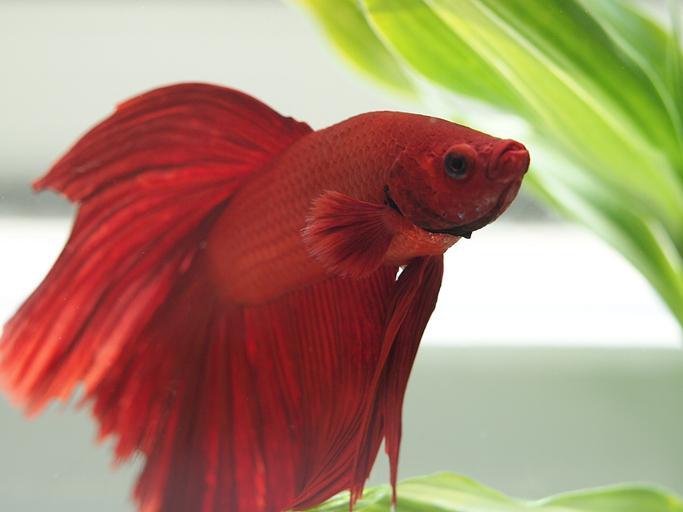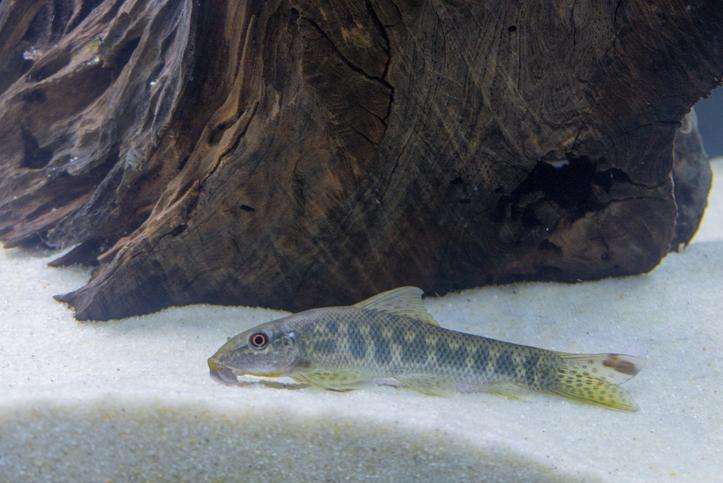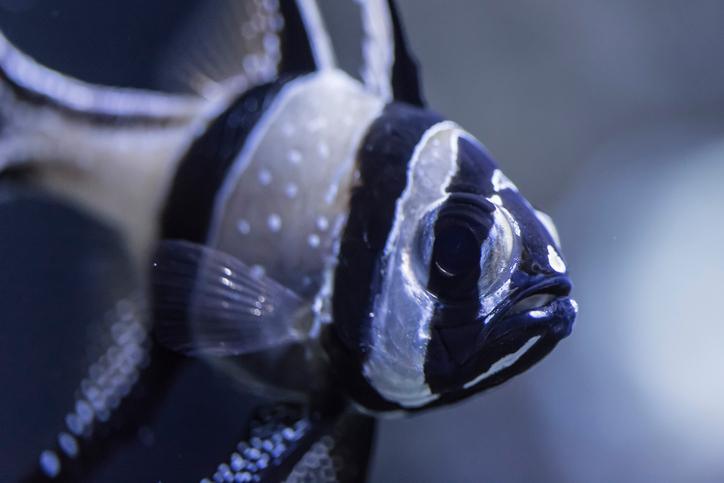How to Know if Your Fish Is Sick?


Fish, like other animals, are susceptible to a variety of diseases, infections, and parasites. Fish can become ill for a variety of reasons, including poor water quality, improper diet, overcrowding, and stress. Certain species of fish are also more susceptible to certain diseases than others. Recognizing the signs of a sick fish can be critical to treating the disease and preventing it from spreading to other fish in the aquarium or pond.
This AnimalWised article explains what the most common symptoms of a sick fish are. We also explain what you can do about it.
- Your fish does not show its fins
- Your fish lies at the bottom of the fish tank
- Your fish is laying on its side
- Your fish does not move, but breathes
- 5. Your fish is rubbing against objects in the fish tank
- Your fish does not eat
- Your fish has white spots on its body
- Your fish moves suddenly and quickly
- Your fish is gasping at the surface of the fish tank
1. Your fish does not show its fins
If your fish is not showing its fins, it is important to observe its behavior and overall health. Stress, for example, can cause a fish to keep its fins close to its body. If the fish is in an environment that does not meet its needs, or if it is being harassed by other fish in the fish tank, it may show signs of stress by holding its fins close to its body.
On the other hand, if a fish's fins are pinched and appear to be stuck to its body, this could be a sign of disease. Some diseases, such as fin rot or bacterial infections, can cause a fish's fins to be clamped together.
2. Your fish lies at the bottom of the fish tank
Lethargy or lack of movement is often a symptom of disease in fish. The fish may be suffering from a bacterial, viral or parasitic infection that is causing it to feel weak and unable to swim.
You should also consider other factors such as water quality and lack of oxygen. If the water in your aquarium is dirty, has high ammonia, nitrite or nitrate levels, or is too hot or too cold, your fish may feel sick and weak. Also, if the oxygen level in the water is too low, they may feel lethargic and even suffocate. This can happen if the water is not properly aerated or if there are too many fish in the aquarium.
The first step is to test the water quality in your fish tank and make sure the aquarium is properly ventilated. If the problem persists, then it is best to consult with a specialized veterinarian.
3. Your fish is laying on its side
If your fish is lying on its side and not moving, this is likely a sign of a serious problem.
One of the reasons could be that your fish is suffering from bladder disease. This is a common disease in fish that affects their ability to control their buoyancy. When fish suffer from swim bladder disease, they may float upward or sink to the bottom of the tank and have difficulty swimming.
Another reason could be internal infection. If your fish has an internal bacterial or parasitic infection, this can cause it to become weak and lose its balance.
Finally, make sure that your fish is not injured or traumatized in any way. This could prevent your fish of swimming properly and may lie on its side at the bottom of the tank.
If you suspect your fish has a swim bladder disease or internal infection, contact a veterinarian who specializes in aquatic animals or a knowledgeable fish fancier as soon as possible. They can help you diagnose the problem and recommend treatment.
In this other article, you can learn more about why your fish swims sideways.
4. Your fish does not move, but breathes
There may be several reasons why your fish is not moving but still breathing.
Depending on the species, fish have different life expectancies, and they become less active as they age. If your fish is older, it may simply be slowing down and becoming less active as it nears the end of its life.
Fish need certain conditions to thrive, such as adequate water temperature, pH, and oxygen levels. If the water in your fish's tank is not properly balanced, it could cause stress or disease. In cases where fish are too stressed, they can become lethargic. You should check the conditions in the aquarium and make changes as necessary to reduce stress.
These are just a few possibilities, and there may be other factors at play. If you are unsure of the cause or are concerned about the health of your fish, you should consult a veterinarian.

5. Your fish is rubbing against objects in the fish tank
Some fish are simply more active and rub against objects as part of their normal behavior. However, if your fish suddenly starts rubbing against objects more frequently, it could be a sign of an external parasite or infection. Fish can rub on objects when they are irritated or uncomfortable, which can be caused by parasites or infections. Look closely at your fish for signs of white spots, redness or other abnormalities.
Fish may also rub against objects in the aquarium if they are suffering from skin irritation or other physical discomfort. This can be caused by a variety of factors, including rough or sharp objects in the aquarium or other aggressive fish.
6. Your fish does not eat
There are several reasons why a fish stops eating. In order to determine the cause, you must first determine whether your fish stopped eating gradually or suddenly.
If your fish has stopped eating gradually, it could be because your fish is aging. As fish get older, their metabolism slows down, and they may be less interested in eating. This is a natural process and not a cause for concern.
Also, it could be because you have been overfeeding your fish. Overfeeding can lead to digestive problems and obesity, which in turn can cause the fish to lose its appetite. Be sure to feed your fish the appropriate amount for their species and size.
However, if your fish stops eating suddenly, it could be a sign of an underlying disease or illness. Some common fish diseases that can cause loss of appetite are bacterial or fungal infections, parasite infestations, and digestive disorders.
Stress is another factor that usually causes fish to stop eating. Fish can become stressed for a variety of reasons, including changes in their environment, aggressive aquarium mates, or improper feeding habits. When fish are stressed, they may lose their appetite and become more susceptible to disease.
If your fish stops eating, it is important to determine the underlying cause and address it promptly. Careful observation, water testing, and consultation with a veterinarian or experienced fish lover can help you determine the best course of action. In some cases, simple changes in environment or feeding habits may be enough to get the fish eating again.
If you want to learn more about this topic, do not hesitate to read our other article on why are my fish not eating?
7. Your fish has white spots on its body
If your fish has white spots on its body, this could be a sign of a parasitic infection called Ich or Ichthyophthirius multifiliis. Ich is a common disease that affects many species of freshwater and saltwater fish. It is caused by a protozoan parasite that attaches to the skin and fins of the fish and causes white spots.
If you suspect your fish is sick with ich, it is important to act quickly to treat the infection. There are a number of treatment options, including medications and changes to the water and temperature in the aquarium. It is best to consult a veterinarian to determine the best course of action for your particular situation.
Do not miss this other article where we explain in more detail why your fish has white spots.

8. Your fish moves suddenly and quickly
Fish are naturally shy and may move suddenly and quickly to avoid predators. If you have recently added a new fish to your tank or changed the environment of the tank, this could cause your fish to feel threatened and behave more erratically. Furthermore, some fish are more aggressive than others and will chase or bully their fellow fish. This can cause other fish to move quickly and unpredictably to avoid the aggressor.
In some cases, sudden movements can be a sign of a nervous system disorder. These disorders can be caused by a variety of factors, including genetics, infection, or injury. In some cases, it is possible that your fish is poisoned by external substances such as copper or chlorine.
9. Your fish is gasping at the surface of the fish tank
If the fish approach the surface of the aquarium to gasp, with heavy breathing, but accompanied by lethargic movements, you should check the low oxygen concentration in the water.
The fish may also gasp for air and also have inflamed or red gills. This happens when there is a gill infection due to a parasite.
If he is just panting, you should check the water conditions. Pay special attention to see if you see a lot of unicellular algae (they turn the water green). If so, add floating plants that will oxygenate the pond, as they will also help eliminate unicellular algae. Another option is to use an anti-algae product.
You may be interested in this other article, where we explain how fish breathe.

This article is purely informative. AnimalWised does not have the authority to prescribe any veterinary treatment or create a diagnosis. We invite you to take your pet to the veterinarian if they are suffering from any condition or pain.
If you want to read similar articles to How to Know if Your Fish Is Sick?, we recommend you visit our Other health problems category.








